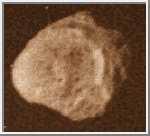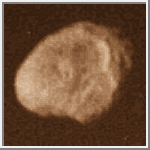













|
Hyperion [hi-PEER-ee-en] is one of the smaller moons of Saturn. It has a pock-marked body and is the largest irregularly shaped satellite ever observed. Hyperion might have had a major collision which blew part of the moon away. Its eccentric orbit makes it subject to gravitational forces from Saturn which have set it tumbling out of control. The moon's rotational period is not constant and varies from one orbit to the next. Hyperion is redder than Phoebe and closely matches the color of the dark material on Iapetus. The largest crater on its surface is approximately 120 kilometers (75 miles) in diameter and 10 kilometers (6.2 miles) deep. The irregular shape of Hyperion and evidence of bombardment by meteors makes it appear to be the oldest surface in the Saturn system.
| Animation of Hyperion |
|---|
| Views of Hyperion |
|---|
 Hyperion
Hyperion
This image of Hyperion was acquired by the
Voyager 2 spacecraft on August 25, 1981.
(Credit: Calvin J. Hamilton)
 Hyperion
Hyperion
This image shows another view of Hyperion. It was acquired by the
Voyager 2 spacecraft on August 25, 1981.
(Credit: Calvin J. Hamilton)
 Simple Cylindrical Map of Hyperion
Simple Cylindrical Map of Hyperion
This map of Hyperion was created from Voyager 2 images of the satellite, and the shape model of Phil
Stooke. The map is centered at 180 degrees longitude.
(Courtesy A. Tayfun Oner)
 Topographic Map of Hyperion
Topographic Map of Hyperion
This is a topographic map of Hyperion. It is based upon the shape model by Phil
Stooke. As with all maps, it is the cartographer's interpretation;
not all features are necessarily certain given the limited data
available. This interpretation stretches the data as far as possible.
(Courtesy A. Tayfun Oner)
Copyright © 1997-2000 by Calvin J. Hamilton. All rights reserved. Privacy Statement.